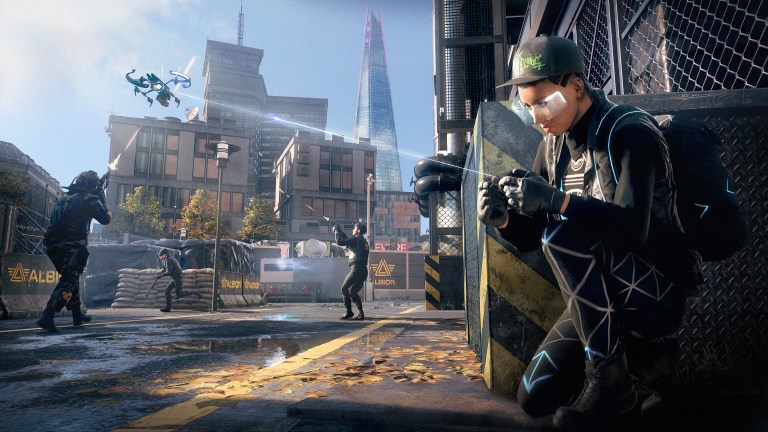Watch Dogs: Legion Review
Watch Dogs: Legion brings the action-adventure series to future London. But is this a future worth exploring? Read our review.

Watch Dogs: Legion’s hook is the ability to recruit and play as any character in London, but this new feature is really more representative of a series in the midst of an identity crisis.
Legion opens with Dalton Wolfe, an operative from DedSec, the hacker group featured in the previous two games, dispatched beneath the Houses of Parliament to defuse bombs set up by the rival hacker group Zero Day. (Apparently every story involving terrorists and London needs to reference the Gunpowder Plot in some way.) Wolfe succeeds in saving Parliament, but loses his life in the process while failing to stop other bombs set up around the city.
DedSec is blamed for the bombings and the British government quickly hires the private security company Albion to establish a high-tech surveillance state covering every inch of London. Things seem pretty grim until you choose a new operative to rebuild DedSec and unravel the conspiracy behind Zero Day.
The story is largely formulaic and at times struggles to make a point. Ubisoft initially described Legion as a vision of post-Brexit London, but while hot button issues like fake news, illegal immigration, and National Health Service funding are regularly referenced, Legion seems too afraid to take any sort of stance on these topics or satirize them like other games such as the much bolder Grand Theft Auto. Ultimately, the plot feels as hollow as the many interchangeable characters you’ll play as.
I started my playthrough with Riordan Doyle, a pistol-packing debt collector with a deadeye, but quickly leveled up to unlock more than a dozen other operatives with a variety of skills. For as much attention as Ubisoft put on the ability to play as anyone you meet on the streets, it never feels very fleshed out, and isn’t all that different from similar systems in the State of Decay and Shadow of Mordor games.
Recruitment begins by pressing a button to learn a few basic facts about a character and the skills they’ll offer DeadSec. These abilities range from powerful new weapons and vehicles to drone summons and unique combat abilities. But some characters also come with disadvantages like poorer stealth abilities or weaker damage resistance.
If your potential DedSec member has a positive opinion of you, you can initiate a recruitment mission, which might involve information gathering, destroying incriminating information, or rescuing one of their friends from Albion. I actually enjoyed many of these missions more than the main campaign, which quickly grows repetitive with countless missions that have you infiltrate a secure areas to hack something before making a quick escape.
Procedural generation comes with its own set of problems. For one thing, character models are pretty bad in the Xbox One X version of the game I played. I’d say they actually look worse than the characters in the first Watch Dogs released in 2014. Leaving character creation to chance also leads to characters who just don’t seem to have voices that match their models.
It leads to other inconsistencies as well. At one point, I was tasked with recruiting a lawyer who would be able to free jailed operatives more quickly. But in order to get her to join DedSec, I had to get information about two men who assaulted her father because she couldn’t get the police to do anything about them, so I don’t think she was quite the formidable criminal defense lawyer she made herself out to be.
Once you have multiple operatives at your side, you are free to change them at any time you’re not in combat or in a restricted area, but don’t expect the smooth transition between characters like in Grand Theft Auto V. Switching operatives is accompanied by an almost 10-second long load screen each time. And you can’t change characters (or even equipment) in restricted areas, which are where the majority of the campaign takes place. Then again, it doesn’t matter much since there’s little incentive to keep changing operatives once you meet a powerful one that matches your playstyle.
Release Date: Oct. 29, 2020
Platforms: XBO (reviewed), PS4, PC, Stadia, XBX/S, PS5
Developer: Ubisoft
Publisher: Ubisoft
Genre: Action-adventure
At the start of the game, you’ll have the option of turning on permadeath. Without it, characters are hospitalized or sent to jail for a short time before they return to the squad. Even if you do play with permadeath on, there’s little risk of losing characters you’ve invested in. Legion’s AI is surprisingly dumb, with enemies constantly walking into gunfire or easily evaded. All in all, these issues make me wish Ubisoft had gone with a more traditional approach to the campaign with one playable character like in the previous Watch Dogs games.
Other gameplay changes are a similarly mixed bag. Legion puts a greater emphasis on stealth and hand-to-hand combat than previous games, but melee controls are just plain bad, using essentially a rock-paper-scissor system of strike, guard break, and dodge. And it rarely seems to work all that well. More often than not, I’d whip out a firearm to quickly end a fight after taking a couple hard hits from enemies. Curiously, even though Albion’s guards are well armed and armored, they’re almost always willing to first try to resolve things with fisticuffs. It’s just a bizarre design decision, especially when Watch Dogs: Legion’s gunplay and driving remain fundamentally solid.
Near-future London, with dozens of self-driving cars on its roads and drones filling its skies, is rendered well enough, although I did notice the frame rate dipping when driving around the city at high speeds. Perhaps that’s why campaign missions focus so much on sneaking around building interiors.
One addition I did enjoy was the ability to hack cargo drones and fly over the London skyline. This gives you the best view of the city and lets you access quite a few areas that are otherwise off-limits, but pretty soon this feature also reveals itself to be a one-trick pony. There’s just not much else to do once you’re in the air.
I do need to note that there are a couple other features I didn’t get to try out. Legion will feature a four-player cooperative online mode, but it won’t be available until December. And while I’m hopeful that some of Legion’s technical issues will be ironed out in the Xbox Series X version, I didn’t have the chance to try that version of the game for this review.
There’s still some fun to be had in Watch Dogs: Legion. Hacking environmental objects to see the reactions of NPCs or raising blockers to evade police remain as amusing as ever, but you’ll really have to make your own fun in this sandbox, or hope that the game’s code spits out one of its better recruitment missions. When you stick to the main story, Legion’s new features feel half-baked, and the plot never comes close to its full potential. This is one of the more disappointing sequels in recent memory.
